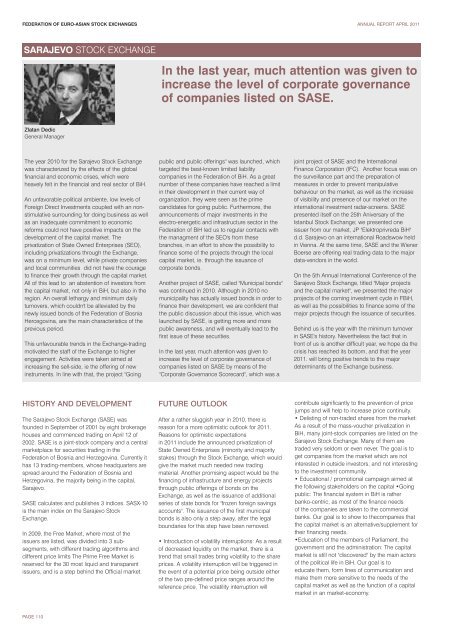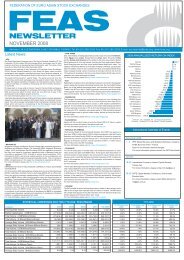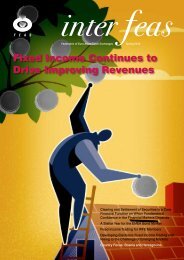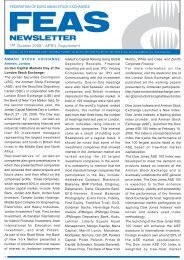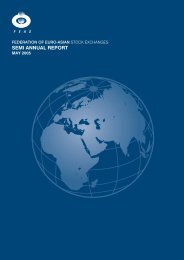Download - FEAS
Download - FEAS
Download - FEAS
You also want an ePaper? Increase the reach of your titles
YUMPU automatically turns print PDFs into web optimized ePapers that Google loves.
FEDERATION OF EURO-ASIAN STOCK EXCHANGES ANNUAL REPORT APRIL 2011<br />
SARAJEVO STOCK EXCHANGE<br />
In the last year, much attention was given to<br />
increase the level of corporate governance<br />
of companies listed on SASE.<br />
Zlatan Dedic<br />
General Manager<br />
The year 2010 for the Sarajevo Stock Exchange<br />
was characterized by the effects of the global<br />
financial and economic crises, which were<br />
heavely felt in the financial and real sector of BiH.<br />
An unfavorable political ambiente, low levels of<br />
Foreign Direct Investments coupled with an nonstimulative<br />
surrounding for doing business as well<br />
as an inadequate commitment to economic<br />
reforms could not have positive impacts on the<br />
development of the capital market. The<br />
privatization of State Owned Enterprises (SEO),<br />
including privatizations through the Exchange,<br />
was on a minimum level, while private companies<br />
and local communities did not have the courage<br />
to finance their growth through the capital market.<br />
All of this lead to an abstention of investors from<br />
the capital market, not only in BiH, but also in the<br />
region. An overall lethargy and minimum daily<br />
turnovers, which couldn't be alleviated by the<br />
newly issued bonds of the Federation of Bosnia<br />
Hercegovina, are the main characteristics of the<br />
previous period.<br />
This unfavourable trends in the Exchange-trading<br />
motivated the staff of the Exchange to higher<br />
engagement. Activities were taken aimed at<br />
increasing the sell-side, ie the offering of new<br />
instruments. In line with that, the project "Going<br />
public and public offerings" was launched, which<br />
targeted the best-known limited liability<br />
companies in the Federation of BiH. As a great<br />
number of these companies have reached a limit<br />
in their development in their current way of<br />
organization, they were seen as the prime<br />
candidates for going public. Furthermore, the<br />
announcements of major investments in the<br />
electro-energetic and infrastructure sector in the<br />
Federation of BiH led us to regular contacts with<br />
the managment of the SEO's from these<br />
branches, in an effort to show the possibility to<br />
finance some of the projects through the local<br />
capital market, ie. through the issuance of<br />
corporate bonds.<br />
Another project of SASE, called "Municipal bonds"<br />
was continued in 2010. Although in 2010 no<br />
municipality has actually issued bonds in order to<br />
finance their development, we are confident that<br />
the public discussion about this issue, which was<br />
launched by SASE, is getting more and more<br />
public awareness, and will eventually lead to the<br />
first issue of these securities.<br />
In the last year, much attention was given to<br />
increase the level of corporate governance of<br />
companies listed on SASE by means of the<br />
"Corporate Governance Scorecard", which was a<br />
joint project of SASE and the International<br />
Finance Corporation (IFC). Another focus was on<br />
the surveillance part and the preparation of<br />
measures in order to prevent manipulative<br />
behaviour on the market, as well as the increase<br />
of visibility and presence of our market on the<br />
international investment radar-screens. SASE<br />
presented itself on the 25th Aniversary of the<br />
Istanbul Stock Exchange; we presented one<br />
issuer from our market, JP "Elektroprivreda BiH"<br />
d.d. Sarajevo on an international Roadswow held<br />
in Vienna. At the same time, SASE and the Wiener<br />
Boerse are offering real trading data to the major<br />
data-vendors in the world.<br />
On the 5th Annual International Conference of the<br />
Sarajevo Stock Exchange, titled "Major projects<br />
and the capital market", we presented the major<br />
projects of the coming investment cycle in FBiH,<br />
as well as the possibilities to finance some of the<br />
major projects through the issuance of securities.<br />
Behind us is the year with the minimum turnover<br />
in SASE's history. Nevertheless the fact that in<br />
front of us is another difficult year, we hope da the<br />
crisis has reached its bottom, and that the year<br />
2011. will bring positive trends to the major<br />
determinants of the Exchange business.<br />
HISTORY AND DEVELOPMENT<br />
The Sarajevo Stock Exchange (SASE) was<br />
founded in September of 2001 by eight brokerage<br />
houses and commenced trading on April 12 of<br />
2002. SASE is a joint-stock company and a central<br />
marketplace for securities trading in the<br />
Federation of Bosnia and Herzegovina. Currently it<br />
has 13 trading-members, whose headquarters are<br />
spread around the Federation of Bosnia and<br />
Herzegovina, the majority being in the capital,<br />
Sarajevo.<br />
SASE calculates and publishes 3 indices. SASX-10<br />
is the main index on the Sarajevo Stock<br />
Exchange.<br />
In 2009, the Free Market, where most of the<br />
issuers are listed, was divided into 3 subsegments,<br />
with different trading algorithms and<br />
different price limits The Prime Free Market is<br />
reserved for the 30 most liquid and transparent<br />
issuers, and is a step behind the Official market.<br />
FUTURE OUTLOOK<br />
After a rather sluggish year in 2010, there is<br />
reason for a more optimistic outlook for 2011.<br />
Reasons for optimistic expectations<br />
in 2011 include the announced privatization of<br />
State Owned Enterprises (minority and majority<br />
stakes) through the Stock Exchange, which would<br />
give the market much needed new trading<br />
material. Another promising aspect would be the<br />
financing of infrastructure and energy projects<br />
through public offerings of bonds on the<br />
Exchange, as well as the issuance of additional<br />
series of state bonds for "frozen foreign savings<br />
accounts". The issuance of the first municipal<br />
bonds is also only a step away, after the legal<br />
boundaries for this step have been removed.<br />
• Introduction of volatility interruptions: As a result<br />
of decreased liquidity on the market, there is a<br />
trend that small trades bring volatility to the share<br />
prices. A volatility interruption will be triggered in<br />
the event of a potential price being outside either<br />
of the two pre-defined price ranges around the<br />
reference price. The volatility interruption will<br />
contribute significantly to the prevention of price<br />
jumps and will help to increase price continuity.<br />
• Delisting of non-traded shares from the market:<br />
As a result of the mass-voucher privatization in<br />
BiH, many joint-stock companies are listed on the<br />
Sarajevo Stock Exchange. Many of them are<br />
traded very seldom or even never. The goal is to<br />
get companies from the market which are not<br />
interested in outside investors, and not interesting<br />
to the investment community.<br />
• Educational / promotional campaign aimed at<br />
the following stakeholders on the capital •Going<br />
public: The financial system in BiH is rather<br />
banko-centric, as most of the finance needs<br />
of the companies are taken to the commercial<br />
banks. Our goal is to show to thecompanies that<br />
the capital market is an alternative/supplement for<br />
their financing needs.<br />
•Education of the members of Parliament, the<br />
government and the administration: The capital<br />
market is still not "discovered" by the main actors<br />
of the political life in BiH. Our goal is to<br />
educate them, form lines of communication and<br />
make them more sensitive to the needs of the<br />
capital market as well as the function of a capital<br />
market in an market-economy.<br />
PAGE 110


